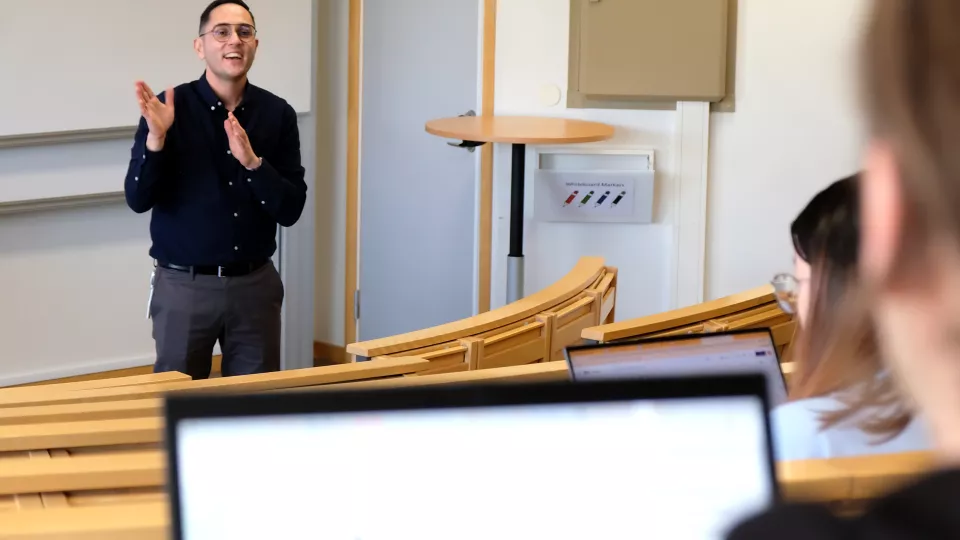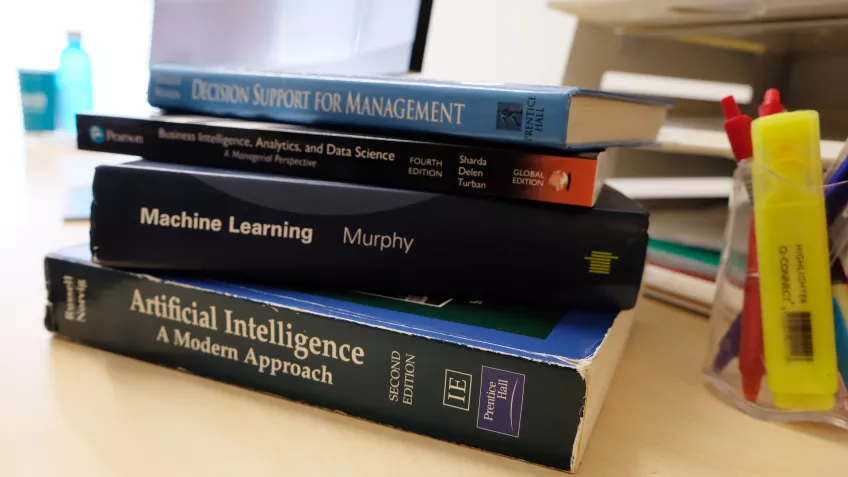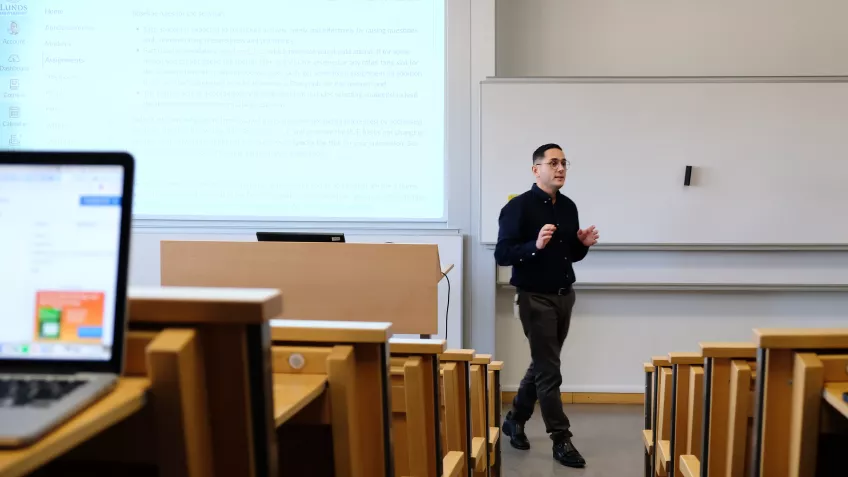Blerim Emruli teaches and researches artificial intelligence, decision support systems and business intelligence. The use of digital tools is more than self-explanatory in his area of expertise, but nonetheless has the pandemic meant an extra burden.
“Perhaps it is a good thing that I work with technology. I am good at going digital. Perhaps it would have been harder if I were a theologian or so and didn’t deal with this every day,” he says during our interview on Zoom, and continues:
“I have really been super busy during the last year. This past autumn I taught two courses in parallel, one on bachelor level and one on master’s. Teaching on Zoom can be so exhausting, it is definitely not as in a physical class.”
60 master students in a digital classroom
From January to March, Blerim Emruli is responsible for teaching an elective course on Business and AI.
“I have master’s students from both the Information Systems Master’s programme and the new Data Analytics and Business Economics Master’s programme. There are 60 students, which is a lot! It is a very large course, with many international students coming from different backgrounds, ranging from computer science to economics.”
The course is given for the second time, but it is also the first time ever it is given to LUSEM’s brand new master’s programme in Data Analytics and Business Economics. This makes it one of the first courses in LUSEM that taught to two Master’s programmes led from two different departments (Economics and Informatics).
Blerim Emruli is happy that so many people have chosen to study the elective course, but he also describes that it is not a light task to read and provide feedback on 60 take-home exams on one’s own.
“I really do enjoy teaching and embracing a challenge, but next time we give this course I hope we stick to the usual designated 40 number of available places. 60 students and all digital … Delivering such a course is very demanding. Other options include involving a PhD student or sharing the course with another senior colleague, in that way I can share what I have learned with others, and ensure the quality of the course and further develop it as a course responsible.”
The digital learning mode during the pandemic, has also come with some practical challenges.
“My aim is to embrace tools to fully digitalise processes and services when possible. In this case, I wanted to be able to use our learning platform Canvas to allow for between group review (one group reviews the work of another group) of assignments, but it turned out that this is not something that Canvas readily provides.”
But Blerim is not the type to give up. Via Lund University’s new Teaching and learning online website education.lu.se, he got in contact with what he calls “the LU Canvas gurus”. One of them, Helena Elvén Eriksson of the Faculty of Science, provided useful feedback on how to create a walk-around for between group reviews, including her personal experience as a teacher using Canvas.
“It is really good that we can share and learn from each other. When talking to Helena, one of our in-house Canvas experts, I realised that even she had problems putting into reality with what I had in mind. However, I think now we have found a walk-around on how to manage between group reviews.”
“Teaching is not what it used to be”
Blerim Emruli is used to working with digital resources in his courses. For the second year in a row, he has been elected as one of the Qlik Educator Ambassadors. Qlik is a business intelligence provider – originally started in Lund in 1993 – offering an end-to-end, data integration and analytics cloud platform. By transforming data into active intelligence, organisations can drive better decisions and improve performance. The Qlik Academic Program offers several free resources to Blerim Emruli and his students.
“We use the Qlik software and online training on Qlik products, up-to-date demos, Qlik customer stories, and applicable self-paced courses. The latter allows me for a flipped classroom or blended learning format, which has been immensely useful during the COVID-19 pandemic,” Blerim said last year in an interview about data literacy.
Today, a year later, Blerim mentions that the pandemic has brought up fully “all things digital” on the agenda. But how to connect the different dots to each other? In the case of Lund University and LUSEM, how do we bring what we have learned about digital education to the next level? How does it all fit into the context of a Triple Crown institution?
“I definitely see the pandemic as an opportunity to learn and for us to continue to deliver high-class education. Teaching is not what it used to be. We should all learn from each other. For instance, just a few years ago a Finnish minister challenged Sweden when Finland promoted the free online course ‘Elements of AI’ – let’s see which country can have the most graduates from the course. At Linköping University they managed to integrate and give academic credits for this course.”
He shares his screen and shows a picture. What you see is the traditional teaching setting, he says.
“Blended teaching and learning with flipped classroom methods should be here to stay. Students do not only learn in a classroom. For instance, Qlik provides us as educators and our students various resources for free, as well as short module-based courses that they have spent a lot of money on. I could not have done the same here alone or even with a help of a colleague, so why not use those resources in my teaching? As Isaac Newton wrote, ‘If I have seen far, it is because I have been standing on the shoulders of giants’. Meaning, we can be really cutting edge by embracing these new initiatives and connecting different actors in our courses in a form of guest lectures or industry-led ’learnathons’, not only by relying on textbooks of 20 years ago”.
Before we end the video chat, another quote comes to mind to Blerim: ‘Necessity and pleasurable intellectual curiosity are key to invention’.
“In these pandemic times, we all know how true it is,” he says.



